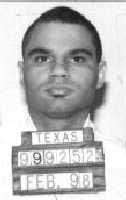Marcus Cotton was executed by the State of Texas for the murder of Gil Epstein
According to court documents Marcus Cotton and an accomplice would rob Fort Bend County Assistant District Attorney Gil Epstein in a parking lot where the victim would be fatally shot
Marcus Cotton would be arrested, convicted and sentenced to death
Marcus Cotton would be executed by lethal injection on March 3 2004
Marcus Cotton Photos

Marcus Cotton FAQ
When Was Marcus Cotton Execued
Marcus Cotton was executed on March 3 2004
Marcus Cotton Case
Sweaty but invigorated after playing a game of basketball, the young Fort Bend County prosecutor could not know that his life’s end was at hand. But seven years and five months later, the man convicted of murdering Gil Epstein on a late summer night outside Houston’s Jewish Community Center is now consumed by the knowledge of his own date with death: Wednesday, sometime after 6 p.m. “I’m terrified,” says Marcus Bridger Cotton, 29, from death row. “Petrified would be more apt. It’s a deer-in-the-headlights-type thing.”
Preparing for what could be his last week, Cotton claimed he is innocent and blamed incompetent court-appointed defense attorneys for botching his trial. So far, though, such claims have fallen on deaf ears in the appellate courts, and the U.S. Supreme Court last week declined to review the case. Cotton’s request for clemency from Gov. Rick Perry and the Texas Board of Pardons and Paroles is the slim chance he has to stop the execution, said his appeals attorney, K.S. Dunn. Cotton was convicted of killing Epstein during a robbery about 10 p.m. Sept. 18, 1996, in the parking lot of the Jewish Community Center in southwest Houston. Cotton and a co-defendant, Lawrence Watson, were arrested about a week after the crime following tips to CrimeStoppers. Watson and two eyewitnesses told police that Cotton was the gunman. Cotton was tried twice. The first trial ended in a hung jury that deadlocked 11-1 for conviction when one juror was unwilling to join deliberations. In articles in the Chronicle after the first trial, the jury foreman and other jurors said the holdout made unreasonable statements, spewed profanities and said that Jews are rich enough to contribute to CrimeStoppers to help solve crimes.
The jury at his second trial, in 1997, convicted Cotton of capital murder in less than a hour. Watson, who had refused to testify at the first trial, appeared at the second trial and said Cotton killed Epstein. Watson later pleaded guilty to aggravated robbery and was sentenced to 10 years in state prison.
Caruthers, now 34, said he was robbed by Watson moments before the shooting. At trial, he identified Cotton as the man he saw in Epstein’s car and who later pointed a gun at him. Another witness, Monique Green, testified that Cotton confided in her that he had shot Epstein after he saw the young prosecutor’s law enforcement badge. Carla Chisholm, the center’s security guard the night of the shooting, testified she saw Cotton aiming a gun at Epstein.
Cotton countered that two witnesses who testified at the first trial that they did not see him at the center the night of the shooting were not called to testify at the second trial. Their testimony, Cotton said, bolstered his claim that he was innocent. But his trial attorney said they were not helpful. In denying Cotton’s appeal in August 2003, the 5th U.S. Circuit Court of Appeals stated that the two witnesses provided “weak evidence that Cotton was not present at the scene.”
The night of the shooting, Cotton had been on parole for about four months for attempted murder when he and Watson rode their bicycles to the parking lot of the Jewish Community Center. When Epstein and Caruthers stepped outside the center, Watson followed Caruthers and Cotton followed Epstein to his black Ford Mustang at the other end of the well-lit parking lot. Watson robbed Caruthers at gunpoint and ordered him to leave. Caruthers drove to the front of the center, told a staff member to call police and drove back to the parking lot. He stopped about 50 feet from Epstein’s car. He saw Watson standing at the car’s rear and Cotton in the front seat. Watson testified that he looked at Caruthers’ car and then heard a shot fired. He said he turned around and saw Cotton shoot Epstein in the head. Caruthers said he saw the robbers ride toward him on their bicycles. Watson sped past him. Then Caruthers put his “car in first gear” and rammed Cotton, who fell down, jumped up, pointed a pistol at him and scampered over a fence.
Marcus Cotton admitted that he has been no angel. He said he was adopted as a 2-week-old by a Houston family. Growing up, he didn’t understand his adopted father’s work ethic. He said that no matter how much his father worked, he struggled to pay bills. Cotton wanted more out of life. He dropped out of middle school and sold crack cocaine and guns. In 1992, he pleaded guilty to possession of a controlled substance and later that year pleaded guilty to attempted murder. One of his regrets, he said, is not seeing his children. He has a 13-year-old daughter and an 11-year-old son he has not seen in more than a decade. He and their mother are estranged. He wishes he could fish with his son and watch his daughter grow up.
In prison, he reads philosophy, writes poetry and draws ink portraits of Jazz musicians like Louis Armstrong. He imagines an afterlife. “I don’t believe it’s paradise,” he said. “I don’t say it’s good or bad. Everything dies to turn into something else.”
http://www.chron.com/cs/CDA/ssistory.mpl/metropolitan/2426828









